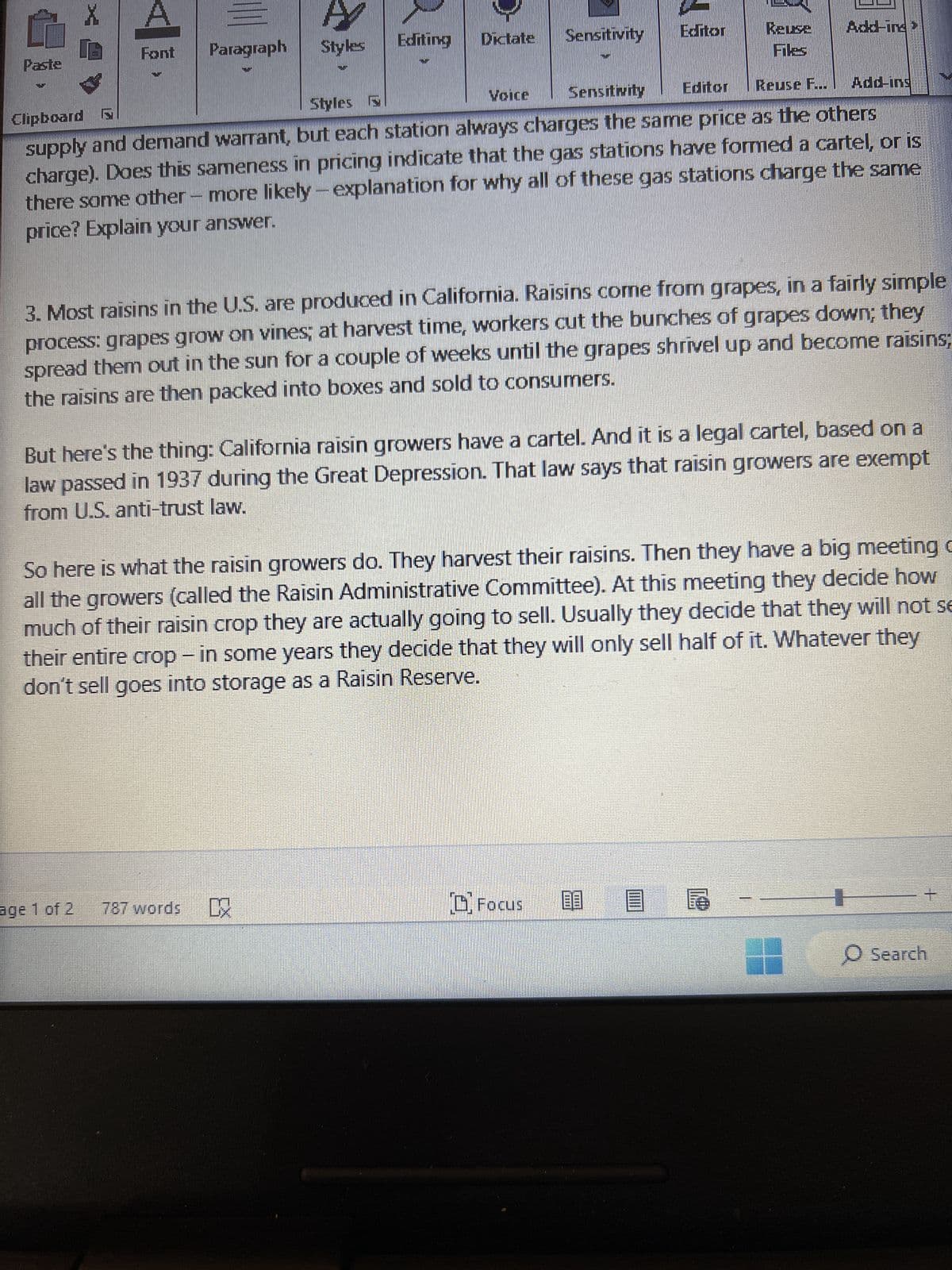Paste X A AY Font Paragraph Styles Editing Dictate Sensitivity Editor Reuse Styles P Voice Sensitivity Editor Reuse F... Clipboard Add-ins supply and demand warrant, but each station always charges the same price as the others charge). Does this sameness in pricing indicate that the gas stations have formed a cartel, or is there some other more likely-explanation for why all of these gas stations charge the same price? Explain your answer. 3. Most raisins in the U.S. are produced in California. Raisins come from grapes, in a fairly simple process: grapes grow on vines; at harvest time, workers cut the bunches of grapes down; they spread them out in the sun for a couple of weeks until the grapes shrivel up and become raisins; the raisins are then packed into boxes and sold to consumers. But here's the thing: California raisin growers have a cartel. And it is a legal cartel, based on a law passed in 1937 during the Great Depression. That law says that raisin growers are exempt from U.S. anti-trust law. So here is what the raisin growers do. They harvest their raisins. Then they have a big meeting all the growers (called the Raisin Administrative Committee). At this meeting they decide how much of their raisin crop they are actually going to sell. Usually they decide that they will not se their entire crop-in some years they decide that they will only sell half of it. Whatever they don't sell goes into storage as a Raisin Reserve. age 1 of 2 787 words DX Focus O Search
Paste X A AY Font Paragraph Styles Editing Dictate Sensitivity Editor Reuse Styles P Voice Sensitivity Editor Reuse F... Clipboard Add-ins supply and demand warrant, but each station always charges the same price as the others charge). Does this sameness in pricing indicate that the gas stations have formed a cartel, or is there some other more likely-explanation for why all of these gas stations charge the same price? Explain your answer. 3. Most raisins in the U.S. are produced in California. Raisins come from grapes, in a fairly simple process: grapes grow on vines; at harvest time, workers cut the bunches of grapes down; they spread them out in the sun for a couple of weeks until the grapes shrivel up and become raisins; the raisins are then packed into boxes and sold to consumers. But here's the thing: California raisin growers have a cartel. And it is a legal cartel, based on a law passed in 1937 during the Great Depression. That law says that raisin growers are exempt from U.S. anti-trust law. So here is what the raisin growers do. They harvest their raisins. Then they have a big meeting all the growers (called the Raisin Administrative Committee). At this meeting they decide how much of their raisin crop they are actually going to sell. Usually they decide that they will not se their entire crop-in some years they decide that they will only sell half of it. Whatever they don't sell goes into storage as a Raisin Reserve. age 1 of 2 787 words DX Focus O Search
Chapter15: Oligopoly And Strategic Behavior
Section: Chapter Questions
Problem 7P
Related questions
Question

Transcribed Image Text:Paste
X
A
AY
Font
Paragraph
Styles
Editing Dictate
Sensitivity
Editor
Reuse
Styles P
Voice
Sensitivity
Editor
Reuse F...
Clipboard
Add-ins
supply and demand warrant, but each station always charges the same price as the others
charge). Does this sameness in pricing indicate that the gas stations have formed a cartel, or is
there some other more likely-explanation for why all of these gas stations charge the same
price? Explain your answer.
3. Most raisins in the U.S. are produced in California. Raisins come from grapes, in a fairly simple
process: grapes grow on vines; at harvest time, workers cut the bunches of grapes down; they
spread them out in the sun for a couple of weeks until the grapes shrivel up and become raisins;
the raisins are then packed into boxes and sold to consumers.
But here's the thing: California raisin growers have a cartel. And it is a legal cartel, based on a
law passed in 1937 during the Great Depression. That law says that raisin growers are exempt
from U.S. anti-trust law.
So here is what the raisin growers do. They harvest their raisins. Then they have a big meeting
all the growers (called the Raisin Administrative Committee). At this meeting they decide how
much of their raisin crop they are actually going to sell. Usually they decide that they will not se
their entire crop-in some years they decide that they will only sell half of it. Whatever they
don't sell goes into storage as a Raisin Reserve.
age 1 of 2
787 words DX
Focus
O Search
Expert Solution
This question has been solved!
Explore an expertly crafted, step-by-step solution for a thorough understanding of key concepts.
This is a popular solution!
Trending now
This is a popular solution!
Step by step
Solved in 2 steps

Recommended textbooks for you

Exploring Economics
Economics
ISBN:
9781544336329
Author:
Robert L. Sexton
Publisher:
SAGE Publications, Inc

Principles of Economics 2e
Economics
ISBN:
9781947172364
Author:
Steven A. Greenlaw; David Shapiro
Publisher:
OpenStax

Managerial Economics: Applications, Strategies an…
Economics
ISBN:
9781305506381
Author:
James R. McGuigan, R. Charles Moyer, Frederick H.deB. Harris
Publisher:
Cengage Learning

Exploring Economics
Economics
ISBN:
9781544336329
Author:
Robert L. Sexton
Publisher:
SAGE Publications, Inc

Principles of Economics 2e
Economics
ISBN:
9781947172364
Author:
Steven A. Greenlaw; David Shapiro
Publisher:
OpenStax

Managerial Economics: Applications, Strategies an…
Economics
ISBN:
9781305506381
Author:
James R. McGuigan, R. Charles Moyer, Frederick H.deB. Harris
Publisher:
Cengage Learning

Principles of Economics, 7th Edition (MindTap Cou…
Economics
ISBN:
9781285165875
Author:
N. Gregory Mankiw
Publisher:
Cengage Learning

Principles of Economics (MindTap Course List)
Economics
ISBN:
9781305585126
Author:
N. Gregory Mankiw
Publisher:
Cengage Learning

Principles of Microeconomics (MindTap Course List)
Economics
ISBN:
9781305971493
Author:
N. Gregory Mankiw
Publisher:
Cengage Learning